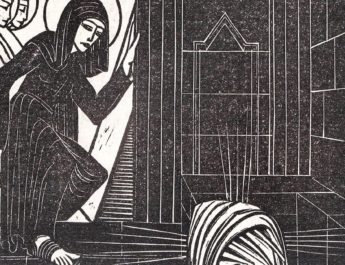Joel 2:27-32
Pentecost Vigil – A Women’s Lectionary
27 You shall knowA that I am in the midstB of IsraelC
A “know” = yada. This is to know, acknowledge, advise, answer, be aware, be acquainted with. Properly, this is to figure something out by seeing. It includes ideas of observation, recognition, and care about something. It can be used causatively for instruction, designation, and punishment.
B “midst” = qereb. Perhaps from qarab (to come near or approach). This is among, in the midst, before, the center It is the inward part, whether literal or figurative. It can also be used for the heart, the site of thoughts and feelings. This word is also used as a technical term for the entrails of the animals who are sacrificed.
C “Israel” = Yisrael. From sarah (to persist, exert oneself, contend, persevere, wrestle, prevail) + el (God or god). This is Israel, meaning God strives or one who strives with God; new name for Jacob and for his offspring. This refers to the people and to the land.
and that I, the Lord,D am your GodE and there is no other.
And my peopleF shall never againG be put to shame.H
D “Lord” = YHVH. From havah (to be, become) or hayah (to come to pass, become, be). This is the name of the God of Israel, the self-existent and eternal one, the tetragrammaton. This pronunciation has been lost to time so “Lord” is generally used in its place.
E “God” = Elohim. Related to “Israel” in v27. See note C above.
F “people” = am. From amam (to darken, hide, associate; creating shadows by huddling together). This is people or nation. It can be used specifically for a tribe, collectively of troops or armies, or figuratively to refer to a flock of animals.
G “again” = olam. This is a long scope of time whether in the past (antiquity, ancient time) or in the future (eternal, everlasting).
H “put to shame” = bosh. Properly, this means to be pale, which implies shame, disappointment, or confusion.
28 ThenI afterward
I will pour outJ my spiritK on allL flesh;M
I {untranslated} = hayah. Related to “Lord” in v27. See note D above.
J “pour out” = shaphak. This is to pour out, gust, or slip. It can be to pour as blood, a drink offering, or molten metal. It can also mean to create a mound. Figuratively, it can refer to killing, or spending money.
K “spirit” = ruach. This is breath, wind, air, cool, spirit. This is wind, which resembles the breath and so this can be used figuratively for life itself or being frail/mortal/impermanent. It can refer to the air of the sky or the spirit.
L “all” = kol. From kalal (to complete). This is all or every.
M “flesh” = basar. From basar (being a messenger, publish, carry preach; properly, this is being fresh, rosy or cheerful as one bearing news). This is flesh, the body, fat, skin, self, nakedness, humankind, or kin. It can also refer to private parts.
your sonsN and your daughtersO shall prophesy,P
your old menQ shall dreamR dreams,S
N “sons” = ben. From banah (to build or obtain children). This is son, age, child. It is son in a literal or figurative sense.
O “daughters” = bat. Related to “sons” in v28. From ben (see note N above). This is daughter in a literal or figurative sense.
P “prophesy” = naba. Related to nabi (prophet, prophecy, speaker; someone inspired). This is to prophesy. It can also refer to an ecstatic state – raving. It is associated with speech, song, teachings, and predictions.
Q “old men” = zaqen. From the same as zaqan (beard or chin – the beard represents old age). This is old, aged, or elder.
R “dream” = chalam. Properly, to bind solidly and so to be plump. This is to be healthy or strong, to recover; figuratively, to dream.
S “dreams” = chalom. Related to “dream” in v28. From chalam (see note R above). This is a dream or dreamer.
and your young menT shall seeU visions.V
29 Even on the maleW and female slaves,X
in those daysY I will pour out my spirit.
T “young men” = bachur. From bachar (to choose, appoint, try, excellent). This is choice, chosen, selected. It is a youth or young man.
U “see” = raah. This is to see in a literal or figurative sense so stare, advise, think, view.
V “visions” = chizzayon. 9x in OT. From chazah (to gaze at – to see or behold; perceiving as a mental process or looking at something with pleasure; seeing a vision). This is a vision or revelation that comes in a dream.
W “male” = ebed. From abad (to work, serve, compel; any kind of work; used causatively, can mean to enslave or keep in bondage). This is a servant, slave, or bondservant.
X “female slaves” = shiphchah. Root may mean to spread out – it would be the same root used in mishpachah, which means family or clan. This is maidservant, female slave, or female bondslave.
Y “days” = yom. Root may mean being hot. This is the day in a literal or figurative sense. It can also mean birth, age, daylight, continually or other references to time.
30 I will showZ portentsAA in the heavensBB and on the earth,CC
Z “show” = natan. This is to give, put, set, offer. It is to give literally or figuratively.
AA “portents” = mopheth. Perhaps from yaphah (to be beautiful, decorate; root means being bright, which implies being beautiful). This is a wonder, miracle, symbol, sign, or omen.
BB “heavens” = shamayim. Root may mean being lofty. This is sky, the air, or heaven. It is in a dual noun form so this might refer to the part of the sky where the clouds move on the one hand and the part beyond that where the sun, moon, and stars are on the other hand.
CC “earth” = erets. Root may mean to be firm. This is earth, ground, field land, or country.
bloodDD and fireEE and columnsFF of smoke.GG
DD “blood” = dam. Perhaps from damam (to cease, be or become mute, silent, still, cut off, hold peace, be astonished, die). This is blood, bloodshed, bloodguilt, lifeblood, and death. It is used for people and animals. More often blood from a wound or the blood of the innocent. Used figuratively for violence or for wine. Closely tied to life and death.
EE “fire” = esh. This is fire, burning, flaming, hot. It is fire in a literal or figurative sense.
FF “columns” = timarah. 2x in OT. From the same as tomer (palm tree, trunk); from the same as tamar (palm tree; root may mean being erect). This is a column or a column that resembles a palm. It could mean a cloud figuratively.
GG “smoke” = ashan. Perhaps from ashan (to smoke or burn in a literal or figurative sense; to be angry). This is smoke, vapor, dust, or anger.
31 The sunHH shall be turnedII to darknessJJ and the moonKK to blood,
HH “sun” = shemesh. This is sun or toward the east. Its root may mean being brilliant. Figuratively, this could be a ray or an arch.
II “turned” = haphak. This is to turn, overturn, change, return, turn over, pervert.
JJ “darkness” = choshek. From chashak (to be or become dark). This is literal darkness is contrast to light. Figuratively, it can be obscurity, sorrow, misery, blindness, wickedness, destruction, death. It can also be hiding places. Additionally, it can mean judgment, mourning, ignorance, evil, or sin.
KK “moon” = yareach. Perhaps from the same as yerach (month). This is moon.
beforeLL the greatMM and terribleNN day of the Lord comes.OO
LL “before” = paneh. From panah (to turn, face, appear). This is face in a literal or figurative sense. It could be face, presence, anger, respect. It can also be used of God to indicate divine favor or presence.
MM “great” = gadol. From gadal (to grow up, become great, become wealthy – to advance. The root meaning may be to twist in the sense of the process of growing). This is great, high, bigger, noble, old, marvelous. It can also refer to someone who is powerful or distinguished.
NN “terrible” = yare. This is to fear, be afraid, dreadful. It can also refer to fearful reverence – to fear in a moral sense is to say to revere, respect.
OO “comes” = bo. This is to enter, come in, advance, fulfill, bring offerings, enter to worship, attack. It can also have a sexual connotation.
32 ThenPP everyoneQQ who callsRR on the nameSS of the Lord shall be saved,TT
PP {untranslated} = hayah. Same as {untranslated} in v28. See note I above.
QQ “everyone” = kol. Same as “all” in v28. See note L above.
RR “calls” = qara. This is to call or call out – to call someone by name. Also used more broadly for calling forth.
SS “name” = shem. May be from sum (to put, place, set). This is name, fame, renown. A name was thought to indicate something essential about a person – something about their individuality. So, this word can also mean honor, authority, or character.
TT “saved” = malat. This is to be smooth, which implies to escape as slipping away from. It can also be release, rescue, deliver, or preserve. It can be used specifically to meaning giving birth or making sparks.
for in MountUU ZionVV and in JerusalemWW there shall beXX those who escape,YY as the Lord has said, and among the survivorsZZ shall be those whom the Lord calls.
UU “Mount” = har. From harar (hill or mountain). This is mountain, hill, hilly region.
VV “Zion” = Tsiyyon. Related to tsyiyyun (signpost, monument); from tsavah (to charge someone, to command, order); from the same as tsiyyah (dryness drought); from a root meaning parched as desert, dry land. Zion can refer to a mountain in Jerusalem as well as another name for Jerusalem itself or the people.
WW “Jerusalem” = Yerushalaim. From yarah (to throw, shoot, be stunned; to flow as water so figuratively to instruct or teach) + shalam (to make amends, to be complete or sound). This is Jerusalem, dwelling of peace.
XX “be” = hayah. Same as {untranslated} in v28. See note I above.
YY “escape” = peletah. From paliyt (fugitive, refugee, or one who escaped); from palat (to escape, slip out, deliver, calve). This is deliverance or escape. It is the remnant that got away.
ZZ “survivors” = sarid. From sarad (to escape or remain; properly, this refers to a puncture, so figuratively it is remaining or escaping by slipping out). This is survivor, remnant, or alive.
Image credit: “The Mystery deepens Scientist believes Planet X caused massive extinction on Earth – Ancient Code” by COSMICCRAZY1, 2020.




